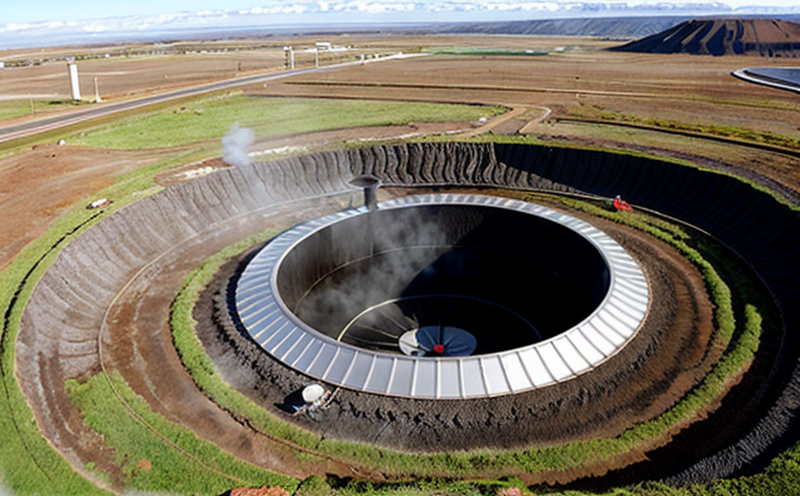EN 10204 Material Certification Testing of Geothermal Components
The EN 10204 Material Certification Testing is a critical procedure used to ensure the quality and compliance of materials intended for use in geothermal energy systems. This test is essential in the realm of renewable energy, specifically for components that will be subjected to high temperatures and pressures. Geothermal energy systems are designed to harness the heat from beneath the Earth's surface, which can reach extreme temperatures, making it imperative that all materials used are robust and reliable.
The EN 10204 standard is widely recognized globally for its stringent requirements on material certification in various industrial sectors, including geothermal. The test not only certifies the compatibility of materials with high-temperature applications but also ensures they meet specified chemical composition and mechanical properties. This certification is crucial to prevent failures that could lead to significant financial losses and safety hazards.
The testing process involves a series of rigorous procedures aimed at assessing the material's integrity, durability, and compliance with international standards. The EN 10204 specifies several methods for certifying materials, including:
- Material Test Certificates (MTC)
- Material Inspection Certificates (MIC)
- Material Inspection and Test Certificates (MITC)
- Material Inspection and Test Reports (MITR)
The choice of certificate depends on the specific requirements of the project and the level of assurance needed. For geothermal components, a combination of these methods may be employed to provide comprehensive material certification.
Scope and Methodology
| Test Procedure | Description |
|---|---|
| Material Inspection Certificates (MIC) | Used for materials that have been inspected and found to be in accordance with the specified requirements. |
| Material Test Certificates (MTC) | Issued when a material has passed all required tests, ensuring it meets the specified quality criteria. |
| Material Inspection and Test Certificates (MITC) | A more comprehensive certificate that includes both inspection and test results for materials used in critical applications like geothermal components. |
The testing process begins with the procurement of raw materials, followed by detailed inspection and testing. The specimens are subjected to a series of mechanical and chemical tests to ensure they meet the necessary specifications outlined in EN 10204. After the tests, a comprehensive report is generated detailing the results, ensuring transparency and traceability.
The geothermal components that undergo this certification include pipes, fittings, valves, and other materials used in the construction of geothermal heat exchangers. These components must withstand temperatures up to 300°C and pressures exceeding 150 bar, making the EN 10204 test a vital component in ensuring their safety and reliability.
Why It Matters
The importance of EN 10204 Material Certification Testing cannot be overstated, especially for geothermal components. The extreme operating conditions in a geothermal energy system can lead to premature failures if the materials used are not up to standard. These failures could result in operational downtime, increased maintenance costs, and even safety risks.
The integrity of materials is critical for the long-term reliability of any geothermal project. By ensuring that all components meet the stringent requirements of EN 10204, stakeholders can have confidence that their systems are robust enough to withstand the harsh environment underground. This not only enhances operational efficiency but also contributes to the sustainability and environmental benefits associated with geothermal energy.
In addition, compliance with international standards like EN 10204 is essential for regulatory adherence and market access. Many countries have stringent regulations governing the use of materials in high-temperature applications, and failure to meet these standards can result in significant legal and financial consequences.
Scope and Methodology
| Test Procedure | Description |
|---|---|
| Material Inspection Certificates (MIC) | Used for materials that have been inspected and found to be in accordance with the specified requirements. |
| Material Test Certificates (MTC) | Issued when a material has passed all required tests, ensuring it meets the specified quality criteria. |
| Material Inspection and Test Certificates (MITC) | A more comprehensive certificate that includes both inspection and test results for materials used in critical applications like geothermal components. |
The scope of the testing process is broad, encompassing a variety of mechanical and chemical tests. These tests are designed to evaluate the physical properties, chemical composition, and structural integrity of the materials. The following table outlines some of the key tests that may be conducted:
| Test Name | Description |
|---|---|
| Hardness Testing | Determines the hardness of the material to ensure it can withstand high temperatures and pressures. |
| Cross-sectional Examination | Inspects the internal structure for any defects or irregularities that could affect performance. |
| Chemical Analysis | Verifies the chemical composition of the material to ensure it meets the specified criteria. |
The methodology for conducting these tests is based on international standards such as EN 10204 and ASTM E8. The testing process is carried out in a controlled environment, ensuring accurate and reliable results. Once all tests are completed, the data is compiled into a detailed report that provides a comprehensive overview of the material's performance.
Why Choose This Test
- Ensures Quality Compliance: The EN 10204 test ensures that all materials used in geothermal systems meet the highest quality standards.
- Enhances Safety: By certifying materials for high-temperature and pressure applications, this test reduces the risk of component failure.
- Facilitates Regulatory Compliance: Many countries have strict regulations governing the use of materials in geothermal systems. This test helps ensure compliance with these regulations.
- Improves Efficiency: Reliable materials lead to more efficient and durable geothermal systems, reducing maintenance costs and downtime.
The EN 10204 Material Certification Testing is a critical step in the development and deployment of geothermal energy systems. By choosing this test, stakeholders can ensure that their projects are not only compliant with international standards but also safe, efficient, and reliable.





